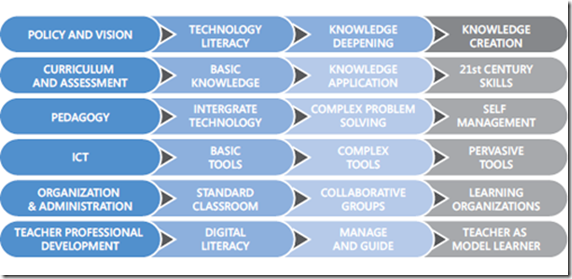Measuring ICT Competencies with the UNESCO CFT
Ever looked for a tool that would tell if are your or your staffs ICT competencies up to scratch for the modern classroom? Ever wondered is there a specific weakness or strength in my staff's ICT competencies?
Research shows that innovative teaching practices, supported by the use of Information Communication Technology (ICT) in the classroom strongly predict students’ acquisition of 21st century skills (Innovative Teaching and Learning Research, 2011) Part of Microsoft’s Partners in Learning professional development offerings, the Teaching with Technology Curriculum is online learning that supports an educator’s professional development in this area. This curriculum focuses on helping educators integrate ICT into their teaching and learning practice and is aligned to the global standards of the UNESCO ICT Competency Framework for Teachers (UNESCO ICT-CFT), Technology Literacy Approach.
Created to help set a foundation beyond learning to use technology tools, educators will develop a deeper understanding of how ICT integration can enhance the teaching and learning experience and enable 21st century skill acquisition via six e-learning Courses:
- Why Does the UNESCO ICT CFT Promote Technology Literacy?
- Selecting ICT Resources to Support Curriculum Outcomes
- How Technology and Pedagogy Mix
- Using Basic ICT Tools to Support Teaching and Learning
- Organize and Manage the Use of ICT in the Classroom
- Technology Literacy and Your Professional Development
What makes this professional development offering unique?
The Microsoft Teaching with Technology Self-assessment and Curriculum are competency-based and can be customized to meet each educator’s needs:
- The Self-assessment helps educators identify the specific learning that they need.
- Each unit of study stands on its own so educators can focus on a specific area of interest or need.
- Using the Self-assessment can help with both online and offline study. By starting with the Self-assessment, educators can determine the best way to fill their learning gaps and then retake the Self-assessment to confirm progress.
- Created by subject matter experts from around the world, the curriculum includes a range of learning scenarios. Whether a classroom has one computer or a laptop for every student, the educator will be able to apply what they have learned to their individual context.
What is Competency-based professional development?
The Microsoft Teaching with Technology Self-assessment and Curriculum are competency-based, which means they help build both skills and the ability to apply those skills to perform a particular job or task. Combined with the global network of educators found on the Partners in Learning network, they help provide six key components for effective competency-based professional development:
- A common set of competency standards defined by role or educational goals.
- Methods for identifying learning gaps.
- Help filling competency gaps with a rich and varied set of aligned resources, such as job shadowing, classes, workshops, and eLearning.
- Assessments, observation, or portfolio work that help verify improved teacher competencies.
- Peer support or mentoring to help teachers carry forward ICT use to the classroom.
- Ongoing refinement of teacher competency materials.
What is the UNESCO ICT Competency Framework for Teachers?
Governments worldwide are striving to improve student outcomes and meet the challenges of preparing a 21st century workforce for a global, knowledge-based economy. The UNESCO Competency Framework for Teachers is a response to these challenges. In 2008, in partnership with Microsoft, Intel, Cisco, and ISTE, UNESCO formalized the UNESCO ICT Competency Framework for Teachers (ICT-CFT) with an aim to measure the ICT proficiency of teachers against a common international standard and to aid in their professional development. These standards were updated in 2011.
How much time will it take?
The amount of time required to develop professional skills using the Self-assessment and Curriculum depends on an educator’s learning needs. Having educators start by completing their Self-assessment allows them to target learning to their needs. The Self-assessment takes about 45 minutes to complete.
How do I get access?
Teaching with Technology content is available through the Microsoft IT Academy Program and soon educators will soon have access to this content in the Partners in Learning Network. For further information on this program and to find out how well the global pilots are being received, drop me an email or a comment.
